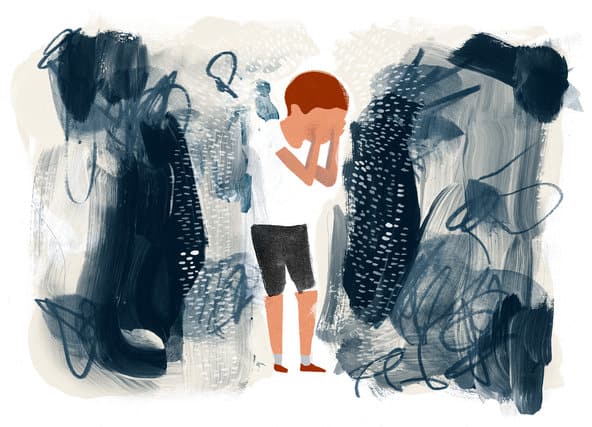In 2016, the number of people estimated to be suffering from mental health issues like depression and anxiety amounted to roughly 1.1 billion. Since then, numbers have likely continued to rise. Moreover, studies have also shown women especially on average are a) more likely to suffer from mental health issues, and b) less likely to talk about them. The taboo in Pakistan surrounding depression and anxiety disorders only serve to aggravate the individuals suffering even more. For the women who cannot seek out full time therapy, or simply need advice about their problems, we’ve enlisted the help of a trained counsellor. You sent us in your questions – here are the answers!

“My parents are not on good terms with each other. My mom mostly compromises to make the environment at home better, leaving her self-respect behind. My dad is telling us about his sacrifices. The thing is: my parents hate each other and my siblings and I are the reason they’re still enduring each other. My dad loves us but it’s suffocating. His moods are the worst; he always finds painful words to make us feel vulnerable. It’s at a point where I don’t hesitate thinking about his death. I am 17 and the last time I was beaten up was in February. Since months now my parents use us to carry their messages while living in the same house, especially Baba, because he can’t compromise on his damn self-respect. Then my mother gets mad and misbehaves, which is bad, but both of them have no compassion for us! It’s like they are the only ones suffering and then they blame us. My dad has a short temper and he doesn’t care if he’s on the streets or else where. All us siblings are extremely frustrated.”

Haya’s Response:
Dear Anon,
We live in a society where labeling parents as “toxic” comes with a whole lot of judgment and stigma. But that doesn’t take the truth away from it. What you are struggling with is a case of emotional abuse via toxic behavior from your parents. The environment for you and your siblings is very toxic and your parents are causing it.

For others who are reading this and may want to understand what toxic parenting is, and whether they identify with it or not, these are the signs:
- Self-Centred & Lacking Empathy: They always put their own needs before anyone else’s. They don’t realize how their behavior impacts others and have a hard time understanding how others feel.
- Emotionally Reactive: Toxic parents often have difficulty controlling their emotions. They overreact and dramatic or unpredictable.
- Controlling: They want to tell you what to do, when to do it, and how to do it. Toxic parents always want to have the upper hand to exert power
- Anger: They’re harsh, aggressive or sometimes even passive-aggressive – using the silent treatment, snide comments or intentionally forgetting things you have said.
- Critical: Nothing you do is ever good enough for a toxic parent.
- Manipulative: They twist the truth to make themselves look good and use guilt and denial to get what they want.
- Blame: They don’t take responsibility for their own behaviour, won’t own their part in contributing to family dysfunction and blame it all on others.
- Demanding: They expect you to drop everything to tend to their needs. They have no concern for you, your schedule or your needs.
- Lack Boundaries: They intrude into your personal space and don’t accept that you are a grown adult.
- Dependent: Your parents have an unhealthy reliance on you.

You’ve mentioned that your parents have used you and your siblings as an excuse to live in denial; they’re staying together by telling you all that you’re the reason they’re still enduring one another. Truth is if they really wanted to leave each other, they would have with or without you guys. This is their way of giving themselves a sense of security and re assurance.
What you are going through is not fair, and it’s NOT YOUR FAULT. I want you to hear and embed those words loud and clear. Your parents are making you feel a certain way and nobody can take that away from you.
What you are going through, and have been for the past several years, is classified as trauma. Your dad using painful words to make you feel vulnerable, your parents blaming you all for the situation you are in, using you as messengers to carry their messages, hitting you, exercising a sense of control over you are all things that are NOT OKAY.

Traumatic experiences from dysfunctional parenting often create unhealthy patterns in us as adults. If we don’t allow ourselves to heal, we will continue to live in cycle of dysfunctional patterns. But as an adult, in the NOW, you need to take certain immediate steps for yourself.
1. Create healthy boundaries
Boundaries help us set clear expectations of how others can treat us and as a child of toxic parenting, unfortunately you weren’t taught this. These boundaries will be able to create emotional and physical space between you and your parents, which you probably didn’t have before. Setting boundaries with toxic people, especially parents, is difficult because they do not respect limits, but don’t let that deter you.
Boundaries are essential to all healthy relationships. Take a minute to think about the boundaries you need to make with your parents and what the first step would be. If you feel like your boundary is to set limits on the time you spend around them, then so be it. It could also be saying no to being used as a messenger.

2. Focus of becoming self-sufficient and independent
This could mean different things for all of your siblings, depending on the stages of life you’re at. When it comes to you, focus on your school, on building healthy relationships outside of school and on working towards loving yourself and wanting to get better. You need to learn how to take care of yourself! Try keeping your day full of things important to you – this will help you grow into your own as a person while limiting the time you spend around your parents.
3. Create space in yourself for your emotion’s and understanding them.
Pay extra close attention to your feelings and notice whether your parents trigger feelings of anger, sadness, guilt, shame or other negative emotions frequently. Once you’re aware of your feelings, figure out what you really need because if you don’t prioritize yourself, no one will. When we grow up with toxic parents, we usually abandon ourselves to be there for them. You’ll need to work on your inner self to change that behavior. Make a commitment to yourself and remind yourself that making space for yourself is not a bad thing.

4. Have a strong support system
Give yourself a safe space – maybe at a friend’s or someone in your family you trust. Give yourself the distance you need, so you can retreat into a safe space. Be clear with your support system about how you want to receive support. It’s very easy to contact a close friend and vent about the situation you’re going through. But that might not always be constructive. Instead, prepare your friends for what may be coming down the line when you are in the presence of toxic parents. Be clear about what you need from them.
Please remember that it is not your fault. Recognizing that your parents have significant problems, and are unlikely to change, paves the way to acceptance. And when we accept people as they are, we free ourselves from the struggle of trying to change them. We can move on to grieving the loss of the ideal parent-child relationship we always wished for. Acceptance is very helpful in restoring your peace of mind.

If things at home are getting unbearable and the situation is not safe for you, please reach out to The Child Helpline: 1121
Sending you lots of light and strength!










What do you think?
You must be logged in to post a comment.